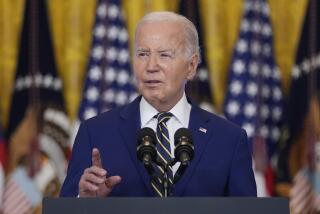U.S. Lifts Some India, Pakistan Sanctions
- Share via
WASHINGTON — President Clinton on Friday removed some of the economic and military sanctions imposed on India and Pakistan after they detonated nuclear devices in May, White House officials said.
“We’re responding to positive steps that both India and Pakistan have taken to address our non-proliferation concerns,” White House spokesman P. J. Crowley said.
The action lifts some, but not all, of the economic sanctions and restores military training and education programs affecting the two countries.
The president hopes that by lifting the sanctions he will persuade both governments to further curb their nuclear programs and reduce the danger of an escalating arms race.
“It’s happening now because we’re entering into another round of consultations, and we want to keep the momentum of this thing moving forward,” a senior foreign policy advisor to the president said.
Officials said another reason for easing sanctions now is that Pakistan’s economic turmoil might prompt it to pursue a risky nuclear program to appease a restive public.
“The worst thing that could happen for proliferation is to have Pakistan collapse economically and be tempted to proliferate more rather than less,” the advisor said.
Under the moves announced Friday, international financial institutions will be able to grant loans to Pakistan to support an assistance program being negotiated with the International Monetary Fund.
Both countries will again be able to participate in programs sponsored by the U.S. Overseas Private Investment Corp., the Trade and Development Agency and the Export-Import Bank.
But restrictions will continue on loans by international financial institutions not related to the IMF plan. Curbs also remain on the export of high-tech products and products with both military and nonmilitary uses. A ban on sales of military equipment to Pakistan also stays in effect.
The president’s decision is an outgrowth of diplomatic efforts undertaken in the aftermath of the detonations.
Deputy Secretary of State Strobe Talbott is expected to meet with his Indian counterpart, Jaswant Singh, later this month, and Pakistani Premier Nawaz Sharif plans to visit the White House in early December.
The sweeping budget bill approved by Congress last month gave the president flexibility to lift or ease the sanctions in accordance with administration policy.
The sanctions were imposed in May after India stunned the world by detonating nuclear devices, and Pakistan quickly followed suit.
In recent weeks, India and Pakistan have made significant progress in three of the four areas that the United States considers necessary, U.S. officials said.
Both nations have agreed to abide by a moratorium on further nuclear tests, pledging to comply with the Comprehensive Test Ban Treaty by September 1999. In addition, both are participating in negotiations on a fissile material cutoff treaty in Geneva and have renewed their dialogue on the decades-long dispute over Kashmir.
Neither nation, however, has made progress on the fourth U.S. priority, cutting back development and deployment of nuclear weapons.
Clinton canceled an autumn trip to South Asia because of proliferation concerns.
White House officials said he would still like to travel to the region and might do so as early as next year if India and Pakistan continue to make progress.
More to Read
Sign up for Essential California
The most important California stories and recommendations in your inbox every morning.
You may occasionally receive promotional content from the Los Angeles Times.













